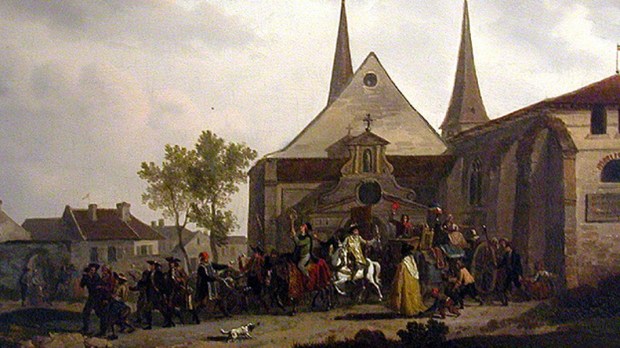“Today’s martyrs stimulate the work of the Church on different fronts,” says Archbishop Celestino Migliore, the pope’s representative to France. And because there are more martyrs now than in all the previous centuries, they are a “pressing call” to both Church and State — to work for religious freedom, but also unity among Christians and friendship among all religions.
The archbishop offered these reflections in a meditation published by the Diocese of La Rochelle et Saintes on August 25. The diplomat was the guest of honor of the pilgrimage to Ile Madame (France), which commemorates each year the martyrdom of more than 800 priests during the French Revolution.
Since 1910, each year on a date around August 27, the diocese of La Rochelle et Saintes has commemorated the assassination of 829 priests who refused to take the constitutional oath required by the Convention and were deported to the pontoons of Rochefort during the French Revolution.
In 1995, Pope John Paul II beatified Jean-Baptiste Souzy and his 63 companions, after recognizing their martyrdom.
“There have been more Christians martyred in the past century than in all the previous centuries,” and the trend is not diminishing, noted Archbishop Migliore in the meditation.
Because they represent “a testimony against the denial of religious freedom and a pressing call to States to implement protective measures,” these “martyrs of today stimulate the work of the Church on various fronts, for example, promoting religious freedom, unity among Christian churches, friendship among the world’s religions, and the transforming power of forgiveness in politics,” he said.
In France 230 years ago, a new world was replacing religion and the Christian faith with a misunderstood sense of “reason,” the nuncio noted sadly at a Mass celebrated on the same day. He pointed to a commonality between the revolutionaries of 1789, a “political and social regime that committed atrocities against so many martyrs,” and revolutionaries of all times: the desire to create a “new man” without limits.
The gentleness of God vs. transhumanism
With transhumanism, an “invasive and galloping revolution, which proposes to change not only living conditions, but man himself, through technology” is underway, he said.
Although this situation can arouse “consternation, anxiety and (…) fear for the future,” the archbishop said we should not fall into “disarray” but rather take the path of “gentleness,” the true image of God the Creator.
On the seventh day, according to the biblical account of Creation, “God rests,” that is, he “sets a limit to his omnipotence (…) to make room for human freedom,” the prelate reflected.
Following God’s example, Christians are invited to take this path, he said, and thus stop thinking of themselves as God. Then, important human activities such as politics, economics, and finance will be transformed.
God’s gentleness “leads us to set a limit upon our tendency to assert ourselves before others, to decide for others, to always speak up, to want to have absolute control over what happens around us,” the diplomat continued. According to him, this is “an effective alternative to the path of violence, which today is often seen as the only way to achieve results.”

